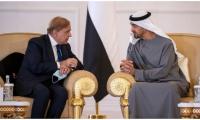ISLAMABAD: Pakistan has invited Turkish companies to invest in power sector as upcoming renewable energy policy is to pave way for incentive-driven investment in the country.
Minister for Power and Petroleum Omar Ayub Khan on Tuesday said the country’s energy sector is fast growing and the renewable energy potential is enormous, “which need to be tapped by the foreign investors”.
“New renewable energy policy is in the process of its approval which will open the sector for new investment,” Khan said during a meeting with Ambassador of Turkey to Pakistan Ihsan Mustafa Yurdakul.
The government finalised the draft Renewable energy policy 2019, which is yet to be approved by the federal cabinet, envisaging 25 percent of total generation capacity from alternative and renewable energy technologies by 2025 and 30 percent by 2030.
Matters relating to bilateral cooperation between the two countries especially in the energy sector were discussed during the meeting between the minister and the ambassador. It was agreed that special areas would be identified by both the countries for the upcoming visit of Turkish President for further enhancing cooperation in the energy sector between the two countries.
The World Bank said share of renewable energy surpassed the global average in Pakistan – one of the world’s top 20 countries accounting for three quarters of the global energy demand, but with more than a quarter of the population without access to electricity.
The World Bank in the Energy Progress Report 2019 said renewable share in Pakistan crossed over the global average of 17.5 percent in 2016 due to traditional uses of biomass for cooking. The country is among the top 20 energy consumers globally that represent only two-thirds of renewable energy consumption. Of them, six countries have renewable shares crossed the global average, according to the World Bank’s report covering the 2010-2017 period. Traditional uses of biomass too dominated the renewable consumption in India, Indonesia and Nigeria. Modern uses of biomass were most prevalent in Brazil and hydropower in Canada.
Pakistan has seen a rapid increase in annual access to electricity and clean fuel between 2010 and 2017, though it is still one of the countries with the lowest electrification rates. The country saw more than one percent increase in electrification during the period, which was one the rapid annual access gains among the world’s top 20 access-deficit countries.
The Turkish Ambassador thanked the federal minister for continued support to the Turkish companies working in Pakistan. He said many Turkish investors are closely following the growing energy sector of Pakistan and are ready to invest in its various fields.







